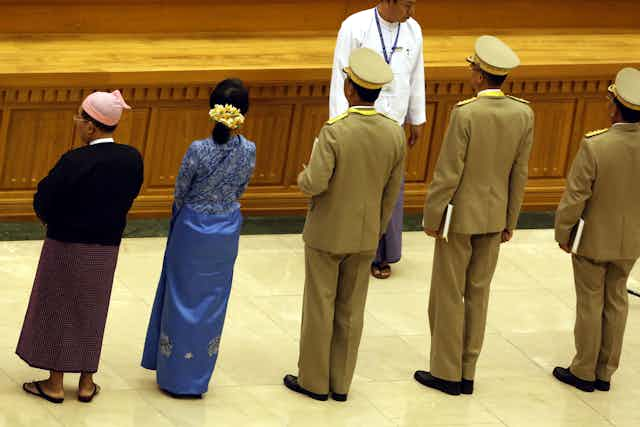As the forced expulsion of the Rohingya Muslims from Myanmar gathers pace and attracts increasing international condemnation, it’s clear that the world either ignores or misunderstands the truth behind Myanmar’s politics. The violent campaign against the Rohingyas is not the disease, but merely a symptom of a political system that has been failing for decades.
When Aung Yan Suu Kyi took office in 2016, it was widely perceived as heralding a new democracy, which transferred power from an authoritarian military regime and handed it back to the people. Suu Kyi’s election became synonymous with the success of peaceful resistance in the name of freedom, a triumph over a long-embedded and despotic junta.
But in reality, nothing changed – and the rapidly escalating Rohingya crisis confirms that the supposed transfer of power has done little to resolve the tensions in the civil-military relationship.
This failure stems partly from the legacy of the military regime, and partly from Myanmar’s geostrategic significance and natural resources, which impel the country’s powerful allies to ward off any effective UN Security Council resolutions against the state’s grave human rights violations.
In domestic terms, Suu Kyi’s rise to power has ultimately made little or no meaningful constitutional impact. The constitution of 2008 guarantees the military 25% of seats in Myanmar’s parliament, the Assembly of the Union, but it can only be amended with the votes of more than 75% of parliamentarians. This de facto military veto safeguards the same regime that’s held sway since the 1960s. Suu Kyi might be the effective head of state, but it’s the military that calls the shots.
This in turn means there’s little hope for resolution in the current Rohingya crisis. Citizenship laws dating back to 1982 bar the recognition of Rohingyas as an ethnic group, and prevent them from holding Myanmar passports. By excluding the Rohingyas from the 2015 census, the regime scotched any hope of ending the decades of human rights violations the Rohingyas have suffered.
Both before and since Suu Kyi took power, the government has responded to the Rohingyas’ deteriorating situation by simply digging in its heels. The former president, Thein Sein, declared in 2012 that the only solution to the crisis was to export the Rohingyas to a “third country” or leave their future to the United Nations. And today, the notionally civilian government seems no more able or willing to take responsibility for the problem.
Suu Kyi might have been a beacon of hope, but behind the scenes, it’s been business as usual. With the military effectively in charge, those trying to help the Rohingyas have their hands tied firmly behind their backs, and the domestic impetus for change is relatively weak – especially now it’s becoming apparent that the persecution of the Rohingyas is not some frenzied, chaotic outburst of ethnic violence, but a concerted national policy.
In limbo
Given Suu Kyi’s long history in the democratic struggle, the world rightly expects her to stand up for the Rohingyas. But to do so would risk going against the will of her own people, and might even motivate the military to replace her. They have the constitutional power to do so; if she strays too far from popular opinion, they could soon have the backing of the Burmese people.
So when Suu Kyi says she’s just a politician and “not Mother Theresa”, she is not balancing competing interests and deterring aggressors, but settling into a life of grisly realpolitik. All the while, the Rohingya crisis damages her credibility among those who campaigned for her release.

Certain other outside powers, however, take a different stance. China, India, and Russia lend Myanmar unwavering support, and back the government line that the crisis stems not from extreme structural problems in the Myanmar polity but from Rohingya “terrorism” that destabilised a period of peace. The EU called on the UN and ASEAN to help, but without some kind of consensus, there is no international mandate to exert pressure.
It seems the supposed democratic sea-change of 2015 has done nothing to solve the civil-military tension in Myanmar. Though soldiers and generals might not be in direct control, they keep their guns on show, and make sure a small but crucial number of personnel are installed in politically active roles. While they can no longer make overarching changes to the political system, they have successfully stymied any constitutional efforts to undercut their power any further.
The result is a political system in limbo, and a government with little incentive to change its ways. In response to international criticism, Myanmar offered some refugees the opportunity to return, but only on the condition that they produce papers confirming their citizenship – papers which the 1982 laws prevent them from holding in the first place. The government seems reluctant to acknowledge that the problem is spiralling out of control; instead, with China and Russia’s backing, it’s trying to convince the world that this very fragile country is far more stable than it actually is.
And so the military retains its power, even as its actions reveal Myanmar’s once-celebrated democracy to be the elaborate PR stunt it is. Meanwhile, the Rohingyas face horrendous human rights abuses – victims of a political regime crippled by cynicism and inertia.

